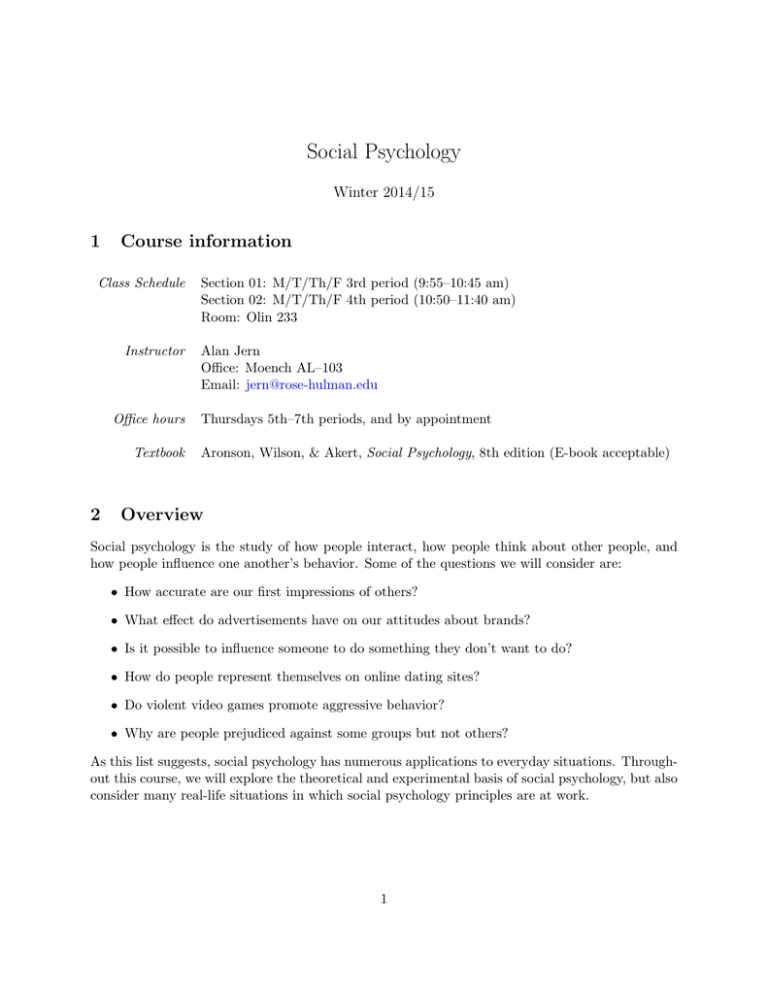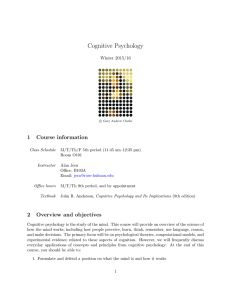Social Psychology 1 Course information Winter 2014/15
advertisement

Social Psychology Winter 2014/15 1 Course information Class Schedule Instructor Office hours Textbook 2 Section 01: M/T/Th/F 3rd period (9:55–10:45 am) Section 02: M/T/Th/F 4th period (10:50–11:40 am) Room: Olin 233 Alan Jern Office: Moench AL–103 Email: jern@rose-hulman.edu Thursdays 5th–7th periods, and by appointment Aronson, Wilson, & Akert, Social Psychology, 8th edition (E-book acceptable) Overview Social psychology is the study of how people interact, how people think about other people, and how people influence one another’s behavior. Some of the questions we will consider are: • How accurate are our first impressions of others? • What e↵ect do advertisements have on our attitudes about brands? • Is it possible to influence someone to do something they don’t want to do? • How do people represent themselves on online dating sites? • Do violent video games promote aggressive behavior? • Why are people prejudiced against some groups but not others? As this list suggests, social psychology has numerous applications to everyday situations. Throughout this course, we will explore the theoretical and experimental basis of social psychology, but also consider many real-life situations in which social psychology principles are at work. 1 3 Assessment Component Exam 1 Exam 2 Exam 3 Assignments (5) Reading responses (7) Participation Total 3.1 Weight 15% 15% 15% 45% 5% 5% 100% Exams (45%) There will be three in-class exams in weeks 3, 6, and 10. There will be no final exam. Each exam will cover only material since the previous exam. All exams are closed-book and closed-notes. 3.2 Assignments (45%) There will be five assignments. Most of these assignments will require you to apply some of the principles you learned in class and then reflect on your experiences. 3.3 Reading responses (5%) On some class days, we will discuss additional readings not in the textbook. To encourage you come to class prepared to discuss each article, I will post a question or prompt about the article on Moodle that you must respond to before class that day. Your reading responses need not be longer than two paragraphs. 3.4 Participation (5%) This class would be boring for all of us without any interaction. Accordingly, I expect you to be an active participant. In addition to asking and answering questions in class, there will be many opportunities for you to participate, including in-class experiments, activities, and discussions. As long as you show good attendance and make a reasonable e↵ort to contribute to the class when appropriate, you will receive full participation credit. I will warn you in advance by email if I feel your behavior is deficient in either of these respects. That means that if you don’t hear from me, you can assume you are on track to receive full credit. If you continue to make an inadequate participation e↵ort after a warning, you will receive a 0 for the participation component of your grade. 2 3.5 Final grade Grades will be assigned as follows. Percentage 90% 87–89% 80–86% 77–79% 70–76% 67–69% 60–66% < 60% 4 4.1 Grade A B+ B C+ C D+ D F Course policies Submitting assignments Unless otherwise announced, all assignments will be submitted in hard copy in class. 4.2 Late assignments For the entire course, you will have two free late days that can be used for assignments ONLY. In other words, you may not use late days for reading responses. Assignments will be considered one day late if they are submitted any time after the start of class on the due date. Assignments will be considered two days late if they are submitted any time between 24 and 48 hours after the submission deadline. You don’t need to notify me in advance if you plan to use one of your late days—I will keep track of your late days and notify you by email when you have no late days remaining. Any assignments submitted after your late days are exhausted will not be accepted. The purpose for this policy is to ensure that I can grade and return your assignments as quickly as possible. 4.3 Academic integrity Academic misconduct will be addressed according to the policies described in the Rose-Hulman student handbook. Academic misconduct includes: (1) submitting work that is not your own; (2) copying ideas, words, or graphics from any source without appropriate citation; (3) misrepresenting your work or yourself (i.e., deliberately submitting the wrong assignment or lying to explain a late assignment); (4) collaborating with other students when this is not permitted; and (5) submitting the same work for credit in two courses without prior consent of both instructors. If you are unsure whether something qualifies as academic misconduct, please check with me before engaging in the behavior. 3 5 Course schedule The following schedule lists topics, readings, and due dates for the whole term. The page numbers refer to the 8th edition of the textbook. I don’t anticipate any major deviations from this schedule, but it is subject to change. Schedule changes will be announced in class and will be posted online. I will give you plenty of notice when such changes are made. Week 1 2 3 4 5 6 7 8 9 10 Date 12/1 12/2 12/4 12/5 12/8 12/9 12/11 12/12 12/15 12/16 12/18 12/19 1/5 1/6 1/8 1/9 1/12 1/13 1/15 1/16 1/19 1/20 1/22 1/23 1/26 1/27 1/29 1/30 2/2 2/3 2/5 2/6 2/9 2/10 2/12 2/13 2/16 2/17 Topic Introduction Methods Social Cognition Social Cognition Social Cognition Attribution Attribution Attribution The Self The Self Review Exam 1 Dissonance Dissonance Attitudes Attitudes Conformity Conformity Conformity Persuasion Persuasion Persuasion Review Exam 2 Groups Groups Groups Groups Relationships Relationships Relationships Aggression Aggression TBD Aggression Prejudice Prejudice Review Reading pp 1–16 pp 27–36 pp 57–63 pp 47–55 Gladwell pp 82–96 Taylor & Fiske pp 109–125 pp 96–99, 126–131 pp 137–147, 154–160 Shu, et al pp 165–180 pp 184–186, 188-192 pp 197–201, 204–219 pp 224–232 Burger Cialdini Due Response Response Assignment 1a Assignment 1b Response Assignment 2a Assignment 2b Response Response pp 181–184, 220–223 Assignment 3 pp 237–242 Zimbardo; “The Menace Within” pp 243–248 pp 249–260 pp 267–279 pp 294–297; OKCupid blog posts pp 284–294 pp 329–340 pp 340–347 Response Response Assignment 4 Assignment 5 pp 361–373 pp 373–389 4 Week Date 2/19 2/20 Topic Exam 3 Conclusion Reading 5 Due



